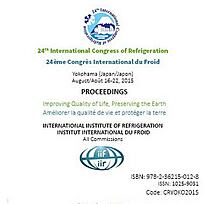
Summary
There are several types of cryocoolers that generate cooling power at cryogenic temperatures. The Gifford-McMahon (GM) cryocooler is the most widely used cryocooler in industrial applications such as cryopumps for semiconductor manufacturing, MRI (Magnetic Resonance Imaging), etc., due to high reliability and ease of operation and handling. GM cryocoolers are closed-cycle regenerative refrigerators originally invented by Gifford and McMahon in 1959. The lowest temperature of commercial GM cryocoolers had been around 10K, primarily due to the very low specific heat capacity of conventionally-used regenerator material (Pb) below 10K. 10K cryocoolers functioned to reduce liquid helium boil-off in superconducting applications, particularly MRI. As MRI and other superconducting applications continued to develop commercially, liquid helium became scarcer and more expensive. This drove the need for cryocoolers to reliably achieve 4K temperatures to further reduce, and even eliminate, helium losses. Research and development activities began in the late 1980s and early 1990s, specifically focused on new regenerator materials and gas sealing technologies to address this need. The world's first 4KGM cryocooler was commercialized in 1996, which became an enabling technology for “zero boil-off” superconducting applications.
Available documents
Format PDF
Pages: 12 p.
Available
Public price
20 €
Member price*
Free
* Best rate depending on membership category (see the detailed benefits of individual and corporate memberships).
Details
- Original title: Expanding market of 4KGM cryocooler.
- Record ID : 30015407
- Languages: English
- Subject: Technology
- Source: Proceedings of the 24th IIR International Congress of Refrigeration: Yokohama, Japan, August 16-22, 2015.
- Publication date: 2015/08/16
- DOI: http://dx.doi.org/10.18462/iir.icr.2015.1001
Links
See other articles from the proceedings (657)
See the conference proceedings
Indexing
- Themes: Small-scale cryogenic applications, cryocoolers
- Keywords: Technology; Gifford-McMahon; Low temperature; Market; Cryocooler
-
Leistungsfähiger Einstufiger Gifford-McMahon Re...
- Author(s) : FIEDLER A., HÄFNER H. U.
- Date : 1996/11/20
- Languages : German
- Source: DKV-Tagungsbericht 23. 1996 Leipzig.
View record
-
One-dimensional numerical analysis for Gifford-...
- Author(s) : ALMTIREEN N., BRANDNER J. J., KORVINK J. G.
- Date : 2019/05/08
- Languages : English
- Source: Cryogenics 2019. Proceedings of the 15th IIR International Conference: Prague, Czech Republic, April 8-11, 2019.
- Formats : PDF
View record
-
Cryoréfrigérateurs : état de l'art.
- Author(s) : RAVEX A.
- Date : 2003/05/20
- Languages : French
- Source: Septièmes Journées de cryogénie et de supraconductivité. Recueil des présentations orales et posters [CD-ROM].
View record
-
Entwicklung eines leistungsfähigen Gifford-McMa...
- Author(s) : LANG A., HÄFNER H. U.
- Date : 1996/11/20
- Languages : German
- Source: DKV-Tagungsbericht 23. 1996 Leipzig.
View record
-
A neodymium plate regenerator for low-temperatu...
- Author(s) : CHAFE J. N., GREEN G. F., HENDRICKS J. B.
- Date : 1996/06/25
- Languages : English
- Source: Cryocoolers 9. Proceedings of the International Cryocooler Conference.
View record
